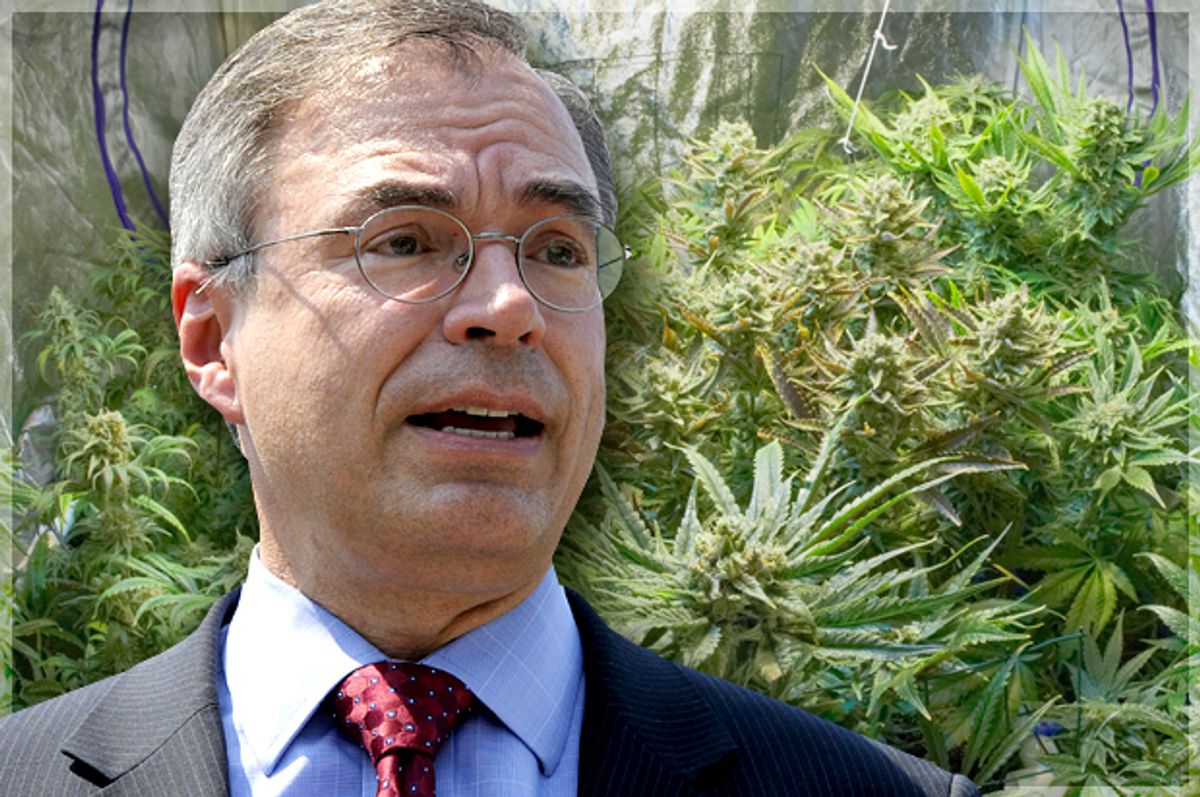There's nothing that congressional budget negotiators love more than kicking around the local government of Washington, D.C. It is their favorite thing to do, and they're allowed to. No voting members of Congress represent the District, but the voting members who represent Kentucky and Maryland and every other state possess final say on all local D.C. laws, which is insane. The Enlightenment was several hundred years ago, for Christ's sake.
I admit I had been fooled into thinking that the patronizing anti-pot-in-D.C. faction of Congress mostly consisted of Maryland Rep. Andy Harris, who was looking for some cultural issue over which to posture ahead of the elections. That whatever amendment he got placed inside a House appropriations bill would ultimately be weeded out of the final appropriations package in negotiations with the Senate. Because who cares? Why is it so important to thwart the will of the District on "the reefer" in a $1.1 trillion omnibus appropriations package? How could this be more a focus of controversy than the tens of billions of dollars just sort of thrown in for further Middle East empire building, or Mitch McConnell's rider to further erode campaign finance limits?
Because it's D.C., and D.C. is punchable.
The early word from budget negotiations yesterday morning was that a deal had been struck to block the marijuana legalization ballot measure that 69 percent of District voters approved on Election Day. That legalized possession of "small amounts" of marijuana. ("Small amounts" in ironiquotes because it means up to two ounces, which is a lot of weed.) The incoming mayor and members of the D.C. Council were preparing work on a matching measure to tax and regulate sales, so that legalized possession might be met with a legal market. Revenue from the sales could go towards funding education or fixing potholes or building soccer stadiums or streetcars of little utility, etc etc, whatever.
As the day went on, it looked like a compromise had been struck that wouldn't have been quite as ludicrous. It would allow the referendum (possession) to go through, but would block the D.C. government from taxing and regulating sales. Better than nothing, but consider, still, how insane even this would have been: Amid negotiations about war funding and destroying campaign finance limits and regulating power plants, congressional leaders also decided that it would be important to codify a black market for marijuana in a certain city of 650,000 people.
The language that appropriators officially settled on, though, is about as bad as could have been expected:
None of the funds contained in this Act may be used to enact or carry out any law, rule, or regulation to legalize or otherwise reduce penalties associated with the possession, use, or distribution of any schedule I substance under the Controlled Substances Act (21 U.S.C. 801 et seq.) or any tetrahydrocannabinols derivative.
"[T]o legalize or otherwise reduce penalties..." -- that sounds like it blocks not only legalization of possession but the decriminalization measure that the DC government passed earlier this year as well.
Why did the Democratic party, which still controls the White House, the Senate, and some House votes that John Boehner will likely need to pass the bill, allow this? The president, Harry Reid, and Nancy Pelosi are on the record saying that they don't approve of meddling with the District's marijuana laws.
But they also have a recent historical record of using D.C.'s concerns as little more than a bargaining chip to toss away in the end.
Congress, under DC's Home Rule charter, is able to veto every law approved by either DC voters or government. In the past, this power has been used to block everything from abortion spending to needle exchange.
During the 2011 budget negotiations, President Barack Obama reportedly used the district's law of paying for low-income women's abortions as a bargaining chip with House Speaker John Boehner.
"John, I will give you DC abortion. I am not happy about it," Obama said, according to The Washington Post.
The Democratic Senate or the White House could still try to stop this. Harry Reid could refuse to bring up the bill until the provision is stripped, and President Obama could issued a veto threat. But they're not going to. The deal has been struck and they're not going to go to the mat, and risk a shutdown, for the citizens of Washington, D.C. Which is why Washington, D.C. so often gets the shaft in these deals.
Hopefully Rep. Andy Harris, Lord Protector of Morality in the District of Columbia, is proud that his amendment from the summer made it into the final appropriations package. It's because he was brave enough to go out of his way that people in a major city will continue going to jail and having their lives destroyed for possessing some weed. Sleep well, pal.



Shares